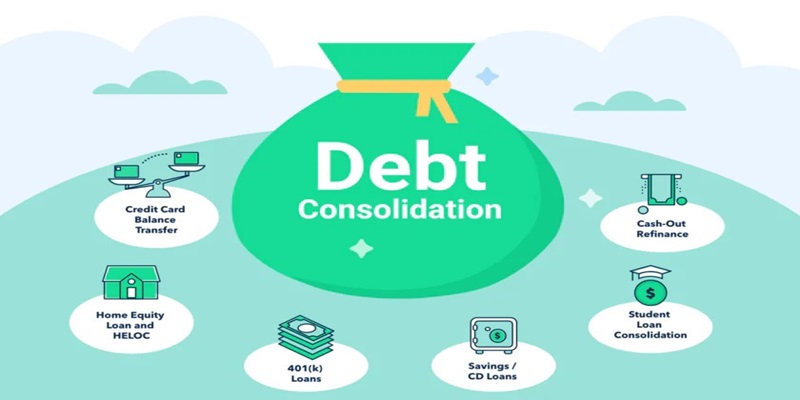Debt Consolidation Vs Debt Settlement - What’s The Difference?
You may have heard the terms "debt consolidation" and "debt settlement" thrown around, but understand the differences to make an informed decision. Both methods deal with debt and may seem similar at first glance, but these two strategies employ entirely different tactics, consequences, and results. While both are supposed to help you gain control of your finances, they work in fundamentally different ways.
Understanding Debt Consolidation

Debt consolidation is a financial strategy that streamlines debt repayment and saves money on interest. It condenses multiple debts into one more straightforward loan or credit line.
How Debt Consolidation Works?
This means consolidating your debts, which entails taking out a new loan to pay off your existing ones. This new loan is generally at a lower interest rate than what you're paying on your current debts, so over time, this will result in plenty of savings. You make a single monthly payment to the new lender instead of sending multiple checks to various creditors every month.
Benefits of Debt Consolidation
Simplified finances: You're less likely to miss due dates with only one payment.
Potential interest savings: A lower interest rate can save money over time.
Fixed repayment schedule: Many consolidation loans have a clear timeline for becoming debt-free.
Types of Debt Consolidation
There are multiple ways to consolidate debt, including personal loans, balance transfer credit cards, and home equity loans. Each has pros and cons, so it's essential to research and compare the different options.
Exploring Debt Settlement As An Alternative

Understanding Debt Settlement
Debt settlement is a different approach to managing overwhelming debt. Rather than combining multiple debts into a single loan, as with consolidation, settlement involves negotiating with creditors to pay less than the full amount owed. This usually occurs through a debt settlement company that acts as an intermediary between you and your creditors.
The Pros and Cons
While debt settlement can reduce your debt burden, it carries significant risks. Conversely, successful settlements may shave your total debt by 20-50%. However, this route can decimate your credit score and may have tax implications for forgiven debt.
The Settlement Process
Debt settlement usually stops creditors' payments and deposits funds into a dedicated account. Once enough money accumulates, the settlement company negotiates with creditors. This process can take 2-4 years and may lead to legal action from creditors during the non-payment period.
Is Debt Settlement Right for You?
Consider debt settlement if you are in severe financial hardship and have explored other options. If you are considering a settlement company, research it thoroughly, as the industry is known to employ deceptive business practices. Never compromise the long term for the short term without careful consideration.
Key Differences Between Debt Consolidation And Debt Settlement
Debt consolidation and debt settlement differ by purpose and approach. While consolidation involves grouping all loans into a single loan, mostly at reduced interest, settlement involves a negotiated reduction of total amounts owed by the debtors to their creditors.
Credit Score
These approaches also impact your credit score differently. Consolidation done responsibly improves your credit in the long term because making payments is streamlined, thus lowering the credit utilization ratio. On the other hand, your credit score goes down if you go for settlement because that entails paying a lesser amount than what was originally due.
The time frame for each varies considerably. Debt consolidation usually involves taking out a new loan with a fixed repayment term, generally 3-5 years. Debt settlement can be a shorter process, sometimes resolving debts within 2-4 years, but it does require a commitment to stop making payments to creditors while you are negotiating.
Financial Implications
While debt consolidation may lower your monthly payments, you will still pay back the amount borrowed plus interest. Debt settlement can reduce the total amount owed but often comes with fees and potential tax consequences on forgiven debt. Both strategies require careful consideration of your financial situation and long-term goals.
Weighing The Pros And Cons Of Each Approach
Debt Consolidation: Simplifying Your Finances
Debt consolidation has several advantages. It simplifies your financial life by combining multiple debts into a monthly payment. This can make budgeting more manageable and reduce the Stress of juggling numerous due dates. Consolidation loans come with lower interest rates, saving you money over time. Additionally, consolidation can help improve your credit score if you make consistent, on-time payments.
Debt Settlement: A Way to Reduce Debt
Debt settlement can be attractive when you are overwhelmed by debt. It can lower your total debt amount, sometimes by a significant percentage. This method can bring relief faster than making minimum payments on several accounts.
Making the Right Choice for Your Financial Future
In any case, the best choice depends on your particular condition. Consider such factors as the total amount of debt you owe, the stability of your income, and even long-term financial goals. It always makes sense to consult with a financial advisor about these options and to choose an option that best fits your needs and circumstances.
Finding The Best Debt Relief Solution For Your Situation

When burdened by overwhelming debt, finding the appropriate strategy for your unique financial situation is essential. Debt consolidation and debt settlement offer possible paths to financial freedom but under different circumstances.
Assess Your Financial Health
Start by examining your current financial state: calculate your total debt, monthly income, and expenses. Then, consider your credit score, long-term financial goals, and employment stability. This overall review will help you decide which may be more suitable.
Consider Your Type and Amount of Debt
The type and amount of your debt are essential in considering which works best for you. Multiple high-interest debts, such as credit card balances, can often be relieved through debt consolidation. A person struggling under a large amount of unsecured debt that they can realistically never pay would fare better with debt settlement.
Consider Your Timeline and Credit Impact
Debt consolidation generally has a less drastic impact on your credit and is usually faster. The settlement can reduce the amount owed but takes longer and hurts credit for years. Consider things that require good credit within the next few years—like buying a home or starting a business.
Making The Right Choice For Your Financial Future
Remember that your financial situation is unique in the face of your choices between debt consolidation and debt settlement. Each has specific pros and cons that you should weigh carefully. Debt consolidation may be a good choice if you qualify for a lower interest rate and commit to a repayment plan. Settlement might work if you're overwhelmed by debt and okay with some bruising of your credit score. Of course, this is the best way to define the goals and ability to follow a debt reduction plan.